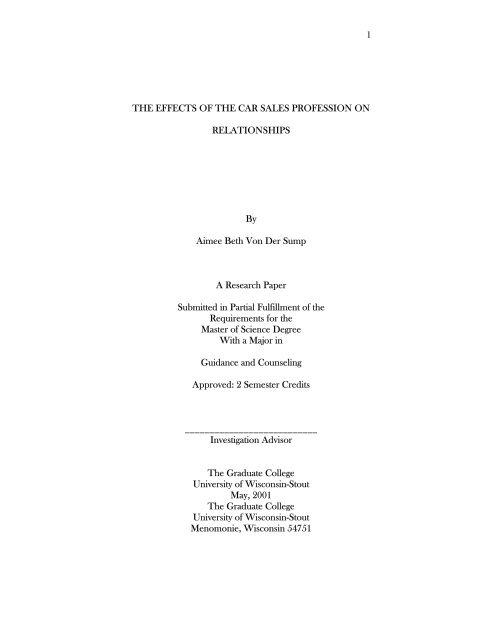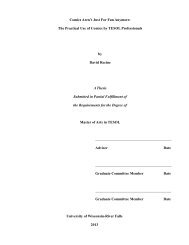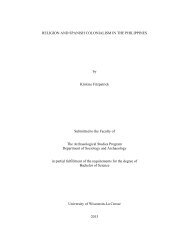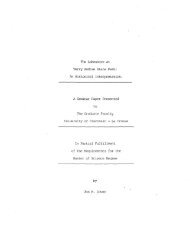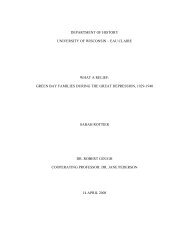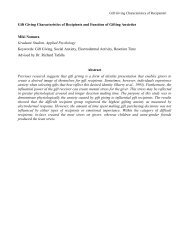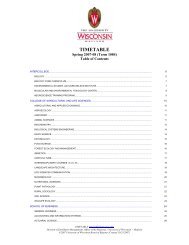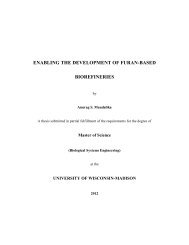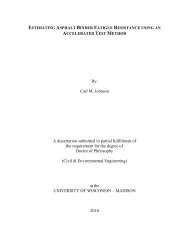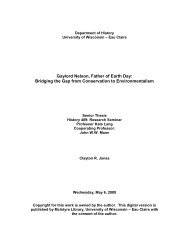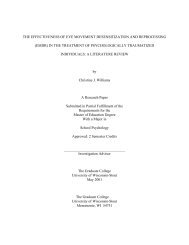1 THE EFFECTS OF THE CAR SALES PROFESSION ON ...
1 THE EFFECTS OF THE CAR SALES PROFESSION ON ...
1 THE EFFECTS OF THE CAR SALES PROFESSION ON ...
Create successful ePaper yourself
Turn your PDF publications into a flip-book with our unique Google optimized e-Paper software.
<strong>THE</strong> <strong>EFFECTS</strong> <strong>OF</strong> <strong>THE</strong> <strong>CAR</strong> <strong>SALES</strong> PR<strong>OF</strong>ESSI<strong>ON</strong> <strong>ON</strong><br />
RELATI<strong>ON</strong>SHIPS<br />
By<br />
Aimee Beth Von Der Sump<br />
A Research Paper<br />
Submitted in Partial Fulfillment of the<br />
Requirements for the<br />
Master of Science Degree<br />
With a Major in<br />
Guidance and Counseling<br />
Approved: 2 Semester Credits<br />
___________________________<br />
Investigation Advisor<br />
The Graduate College<br />
University of Wisconsin-Stout<br />
May, 2001<br />
The Graduate College<br />
University of Wisconsin-Stout<br />
Menomonie, Wisconsin 54751<br />
1
Abstract<br />
Von Der SumpAimeeB.<br />
(Writer)(Last)(First)(Initial)<br />
The Effects of the Car Sales Profession on Relationships<br />
(Title)<br />
Guidance and Counseling_Dr. Gary Rockwood May2001 58<br />
(Graduate Major)(Research Adviser)(Month/Year)(No. Pages)<br />
Publication Manual of the American Psychological Association<br />
(Name of Style Manual Used in this Study)<br />
This research project investigated the relationship between<br />
infidelity and the car sales profession. Twenty-nine salesmen participated<br />
in the project. Sixteen salesmen were car sales professionals and thirteen<br />
salesmen sold another type of product. Both groups of salesmen<br />
responded to the questionnaire that the researcher developed.<br />
From the questionnaire a statistical analysis was compiled to<br />
determine if there was a difference between the car salesmen and other<br />
salesmen in regards to infidelity. The hypothesis was that there would be<br />
a difference between the rate of infidelity among certain types of<br />
salesmen, car salesmen having the higher rate. Significant differences were<br />
found between the rate of infidelity among car salesmen versus salesmen<br />
from other product types. Implications of the findings are discussed and<br />
recommendations for counselors, car dealerships, and future research<br />
projects are given.<br />
2
ACKNOWLEDGMENTS<br />
The knowledge about the subject of relationships this researcher<br />
gained during this project has given her a greater understanding of the<br />
difficulties all people involved in relationships encounter and will allow<br />
her special perspective and sensitivity in dealing with couples and their<br />
families in her professional career.<br />
First, this researcher would like to thank Dr. Gary Rockwood for<br />
taking over as research advisor. His patience and accommodations<br />
allowed this researcher to finish this project.<br />
This researcher would also like to thank the brave salesmen who<br />
volunteered to answer very personal questions so this researcher could<br />
gain knowledge of their extraordinary lifestyle.<br />
This researcher would like to thank the people who meant so<br />
much when this project began; however, during the long process were lost<br />
along the way. Their physical presence is no longer, but their spirit and<br />
the good memories will remain forever.<br />
Finally, this researcher also needs to thank her parents for never<br />
giving up on her and continuing to encourage her to make her mark in<br />
the lives of those she helps. Their sacrifices so that she could achieve her<br />
dreams were monumental.<br />
3
TABLE <strong>OF</strong> C<strong>ON</strong>TENTS<br />
Acknowledgements....................................................................... 4<br />
Chapter I Introduction........................................................... 7<br />
Statement of Problem............................................ 10<br />
Null Hypothesis..................................................... 10<br />
Definition of Terms................................................ 12<br />
Chapter II Causes for Male Infidelity...................................... 13<br />
4<br />
Page<br />
Self-Esteem................................................ 13<br />
Dissatisfaction in Committed Relationship... 14<br />
Accessibility............................................... 14<br />
Freedom..................................................... 16<br />
Opportunity................................................ 17<br />
Situational.................................................. 18<br />
Intimacy..................................................... 19<br />
Societal Pressure........................................ 20<br />
Sex............................................................. 21<br />
Excitement of Secrecy................................. 23<br />
Life Changes................................................ 24<br />
Sales Professionals and Infidelity................. 25<br />
Career.......................................................... 25<br />
Addicts......................................................... 26<br />
Impulsivity.................................................... 27<br />
Macho.......................................................... 29<br />
Chapter III Methodology............................................................ 31<br />
Introduction............................................................. 31<br />
Research Questions.................................................. 31<br />
Description of Subjects............................................ 32<br />
Sample Selection...................................................... 32<br />
Instrumentation........................................................ 33
Procedures............................................................... 33<br />
Data Analysis........................................................... 34<br />
Methodological Limitations...................................... 34<br />
Chapter IV Data Analysis and Interpretation............................... 36<br />
Introduction............................................................. 36<br />
Analysis and Interpretation....................................... 37<br />
Summary.................................................................. 47<br />
Chapter V Summary, Conclusion, and Recommendations.........49<br />
Summary.................................................................. 49<br />
Conclusion............................................................... 51<br />
Recommendations.................................................... 53<br />
References...................................................................................... 56<br />
5
Chapter I<br />
Introduction<br />
The perception in the American culture regarding salesmen has been held almost<br />
as long as the sales profession itself. Shorris (1994) described salesmen as creatures<br />
without roots and having more acts than actual substance. He proposed this because<br />
salesmen do not stay long in people's lives. The encounters that salesmen have are<br />
superficial and reveal nothing of their true character. Shorris (1994) surveyed the sleaziest<br />
career options in the view of the American public. His survey showed seven of the top<br />
occupations involved sales of some type. The Webster dictionary stated “sleaze or sleazy,<br />
when applied to a person, denotes low moral standards“ (Webster, 1984, p.561). Yet,<br />
despite the perception, the American population buys what they sell. The American<br />
population is not only drawn to salesmen, but also rewards them for unethical and what is<br />
thought by some to be immoral behavior. Shorris (1994) believes the societal reaction to<br />
unethical behaviors makes ethics challenging for salesmen because it sets no boundaries.<br />
It appears society does not only fail to shun unethical salesmen, it appears to compensate<br />
them for their behaviors. Shorris continued by stating the moral life of salesmen becomes<br />
the salesmen's’ choice.<br />
Before the competition of an industrialized society, there were a limited number<br />
of salesmen considered dishonorable in their profession. At this time in society, product<br />
options were limited as well as where one could purchase them. As society grew and<br />
technology improved, competition increased. From this increase in competition, a new<br />
type of salesmen evolved.<br />
Salesmen suddenly had to be equipped to compete against other products, other<br />
6
locations, other prices, and even other salesmen. This change attracted and required a<br />
new type of individual that would be able to make the sale. No longer do American<br />
consumers run to the one and only merchant and goods store in town to buy all of their<br />
supplies, they now shop at one of the many product and specialty stores.<br />
"In the 1940s Dr. Kinsey found in his ground breaking report that fifty percent<br />
(50%) of the married men interviewed had had affairs... In the years since Kinsey<br />
reported, ...men seem to have changed their extramarital behavior very little" (Weiner<br />
and Starr, 1989, p.4). Any man whom confines his sexual attentions purely to his wife is<br />
one up (or more accurately several down) on most of the rest of the adult male<br />
population. “Monogamy is one of the hardest of all man made rules for the average man<br />
to keep” (Miles, 1991, p.187). Miles stated that 80-90% of men has had at least one<br />
episode of infidelity during the course of a marriage or partnership lasting longer than<br />
three years. Most men do not feel this is adultery and reserve that term for longer and<br />
more fully developed relationship. If "normal" and "natural" masculine behavior bears any<br />
relation to what the majority of men actually do, then infidelity is one of the most normal<br />
and natural of male activities. It appears the craving for diversity is an innate masculine<br />
need and having many conquests a natural instinct. There are men who will negate<br />
infidelity does any damage to a relationship (Miles, 1991).<br />
Human nature attracts people to one another. People look at others that they<br />
find attractive or are drawn to people with similar interests. Weiner and Starr (1989)<br />
reported society realizes though in a committed relationship, people are not blind.<br />
People need the stimulation of interacting with others and having themselves validated by<br />
another person's attention or interest. "Inclination and fantasy are universal, but action is<br />
7
local and specific" (Weiner and Starr, 1989, p.9). Any relationship that has a person that<br />
feels unhappy or unfulfilled in any area of the relationship is at risk for an affair. People<br />
with certain personality types combined with certain circumstances seem to have a greater<br />
rate of infidelity in their relationships.<br />
There are personality traits that seem to be commonly linked to the sales<br />
profession. For example, some salesmen have issues of addiction in regards to alcohol.<br />
Often these traits displayed are the reasons that people believe salesmen have lower<br />
personal standards and the same reason that people buy what they sell. Salesmen seem<br />
to need certain characteristics to become successful in their profession. Unfortunately,<br />
sometimes there are certain personality traits become a way of life and begin to destroy<br />
and erode the salesmen's intimate relationships.<br />
It seems that there is a difference in the rate of fidelity even among salesmen.<br />
There are some restrictions, environmental differences, and opportunities that certain<br />
types of salesmen have that do not apply to salesmen who work in the car sales<br />
profession. The majority of salesmen share many of the same personality traits that may<br />
make them more vulnerable for the temptation to be unfaithful. This is where the<br />
difference becomes action.<br />
Statement of Problem<br />
The purpose of this study was to determine the difference in the frequency of<br />
infidelity between car salesmen and salesmen of other products. Though many salesmen<br />
have a personality that predisposes them to engage in affairs, the car sales profession<br />
creates a lifestyle that alienates the salesmen's significant other and promotes infidelity.<br />
The research problem was stated: Though individuals choose what behaviors to engage<br />
8
in, what is the relationship between infidelity and the car sales profession.<br />
Null Hypothesis<br />
Null Hypothesis #1<br />
There is no statistically significant difference in alcohol usage between car<br />
salesmen as compared to other salesmen.<br />
Null hypothesis #2<br />
There is no statistically significant difference in the thought and behavior pattern<br />
of car salesmen as compared to other salesmen who do not sell cars.<br />
Null Hypothesis #3<br />
There is no statistically significant difference in when thoughts regarding affairs<br />
begin for car salesmen as compared to other salesmen who do not sell cars.<br />
Null Hypothesis #4<br />
There is no statistically significant difference between car salesmen and other<br />
salesmen regarding how many affairs they have had and how many people they have<br />
affairs with at same time.<br />
Null Hypothesis #5<br />
There is no statistically significant difference regarding the length of car<br />
salesmen’s affairs as compared to other salesmen’s affairs.<br />
Null Hypothesis #6<br />
There is no statistically significant difference whether car salesmen as compared<br />
to other salesmen regret their affairs.<br />
Null Hypothesis #7<br />
There is no statistically significant difference regarding whether car salesmen as<br />
compared to other salesmen believe their affairs have affected their relationship with<br />
their significant other.<br />
Definition of Terms<br />
9
Addict-Individual who gives up control of self to a stronger habit.<br />
Covert- Behavior that is internal and not directly observable (Sarason, 1989, p.555).<br />
Extrovert-Individual whose interest is more in his environment and in other people than<br />
in himself.<br />
Fidelity-Faithful devotion to duty; loyalty.<br />
Impulsive-Characterized by a lack of forethought or planning (Sarason, 1989, p.561).<br />
Infidelity-Unfaithfulness. Relationship or affections toward one while involved or<br />
committed to another.<br />
Intimacy-Private and personal; close and familiar.<br />
Personality-Particular constellation of attributes that define one’s individuality (Sarason,<br />
1989, p. 565).<br />
Predispose-To make susceptible; to incline.<br />
Chapter II<br />
10
Review of Related Literature<br />
There has been much research done on reasons why men engage in infidelity.<br />
There are many common themes to infidelity, yet no one distinct cause for affairs. There<br />
are two factors that need to be explored: the reasons why men engage in infidelity and<br />
why car salesmen have a higher rate of infidelity than others do in the sales profession.<br />
Causes for Male Infidelity<br />
Self-Esteem<br />
One of the reasons that men cheat is for self-esteem. Farrell (1986) stated most<br />
men spend their lives performing-in sports, at sex, on the job-"proving themselves" in one<br />
form or another. It is in the performing, the accomplishment and the recognition that<br />
they meet their needs and validate they are worthwhile men. Berkowitz (1990) agreed<br />
with Farrell (1986) that most men invest their ego in two specific areas: their career and<br />
their sex life. These two areas reaffirm that they are men. Positive reinforcement is not<br />
as accessible to adults and rare when it comes to sexual performance. This positive<br />
reinforcement has a tremendous impact and generates its own reward. Some men tend to<br />
have complications when self-esteem is decreased and they start to look for<br />
encouragement from other women and other activities. As an extramarital affair evolves,<br />
it reassures men they are still sexually attractive, that they are not becoming impotent, and<br />
that someone demonstrably believes them to be important. “The new relationship gives<br />
them an exciting sexual experience. More importantly, the relationship increases men's<br />
self-esteem. They feel wanted and important.”(Llewellyn-Jones, 1983, p.231). Reibstein<br />
(1993) stated if a man feel at home he is seen as a nuisance, with his lover he is seen as a<br />
king. Weiss (1990) stated men who are unsure of themselves may want the boost to their<br />
11
morale that sexual acceptance can provide.<br />
Dissatisfaction in Committed Relationship<br />
Another reason men cheat is they are unsatisfied with their current relationship<br />
or family life. Zilbergeld (1992) believed the reasons people enter into affairs vary<br />
considerably. Sometimes the reason is that with the outside lover they get something<br />
important they are not getting in their relationships. That something can be sexual (the<br />
excitement of sex with a new partner, more sex, less hassled sex, and so on) or non-<br />
sexual (greater acceptance or even adoration and a lack of criticism, better conversation,<br />
or just more fun). Some feel they are not understood, taken for granted or lacking<br />
something they crave in their relationships. Berkowitz (1990) stated they are after<br />
emotional or sexual satisfaction and attention that is absent at home.<br />
Accessibility<br />
A marital partner's accessibility was a source of friction. Weiss (1990) stated<br />
about 25% of men in the sample reported tension over one partner's availability to the<br />
other. Most often physical absence was the problem. The men's wives objected to the<br />
men working late, missing the evening meal and being away on business over a weekend<br />
or, even worse, a holiday. Weiss (1990) reported men complained about their wives<br />
complaints. They felt misused if they arrived home after a hard day only to be told that<br />
they should have been home earlier, that the children were out of hand because they<br />
were so unavailable, that house repairs awaited their attention, and that they did too little.<br />
“Men would need to work more than 40 hours and often nights and weekends, end up<br />
giving their family residual time, time that is not required by their work” (Weiss, 1990,<br />
p.261).<br />
12
They use their relationship as an excuse at times, but they derive some benefit<br />
from their current committed relationship or they would not remain in it. Some of the<br />
reasons men state they remain in their unsatisfying relationships are because they give<br />
them a sense of stability, sense of social acceptability and security in their roots--home,<br />
kids, a place they belong. As a society, there are certain expectations of the roles to be<br />
played in the husband/ wife relationship. The restrictiveness of these marital roles can<br />
make men more vulnerable to affairs where they can be themselves. Affairs represent<br />
newness, variety, freedom, and fun, just as marriages are filled with roles and<br />
responsibilities. Some men begin to view themselves and their significant others by the<br />
functions they serve in the relationship. There are struggles in all relationships; therefore,<br />
each relationship can describe something missing. With no perfect relationships in<br />
existence, Vaughan (1989) cautioned the assumption of a cause and effect between<br />
specific problems and affairs was much too narrow an explanation of such a complicated<br />
issue.<br />
Freedom<br />
Men’s desire for control and confirmation are two of the reasons psychologists<br />
cited for men’s infidelity. “What can attract men into an extramarital affair is the fantasy<br />
notion that complications can be wiped out and control regained” (Berkowitz, 1990,<br />
p.180). Weiss (1990) stated once involved in an extramarital relationship, men find its<br />
very separateness from the rest of their lives gave it special value. It becomes a kind of<br />
time out from responsibility, an interval in which they can again be free from the burden<br />
of social expectation. There are other possible partners for affection and for sex, and with<br />
them there is the possibility of, at first, beginning again without responsibility, without the<br />
13
history of small hurts and betrayal, without commitments except to the present. This is<br />
clearly the case with a brief adventure, but it can be the case as well with an established<br />
affair. Weiss (1990) reported with another woman, men find escape. Yes, there may be<br />
anxiety because outside her door is a world from which he has only temporarily slipped<br />
away. Because a man's relationship with a new woman is free of the burden of the man's<br />
past, the man can assume a new self without her. “With the new woman, he is the<br />
person he is today, not, as may be true for his wife, yesterday's person dressed up in a<br />
new suit. New understandings begin to be established with the new woman, new ways of<br />
seeing himself and the world that feel to him more true to himself than the<br />
understandings he shares with his wife. He feels truly authentic only with the new<br />
woman” (Weiss, 1990, p.249).<br />
Opportunity<br />
Kurtz (1986) stated a man will not have trouble finding extramarital sex these<br />
days, though he may have a hard time avoiding it, and he is bound to have a difficult time<br />
getting rid of it. Berkowitz (1990) suggested stripping away the moral absolutes and think<br />
of a straightforward cause and effect to explain infidelity. Traditionally, men have<br />
cheated because they have had more opportunity to cheat. Most men when asked say<br />
they are not on the lookout for extramarital sex, but if it presented itself they would not<br />
fight off the women too hard. It appears some men are open to affairs because there are<br />
many women who are sexually available and see all men, regardless of their relationship<br />
status, as available partners. Part of opportunity is where these married men find these<br />
women. Weiss (1990) reported men meet potential sexual partners not only in the<br />
14
offices of colleagues and in their own offices, but at church, Cub Scouts, PTA meetings,<br />
and at parties and dinners. The idea something might happen certainly occurs to them.<br />
Vaughan (1989) believed opportunity and circumstance play far more important a role<br />
in determining an affair than any specific qualities of the third party. This is why there<br />
are so many affairs among people who work together or have opportunities for<br />
developing close relationships. Botwin (1988) stated research has shown opportunity to<br />
be a prime determinant in whether a man will stray or not, and opportunities have<br />
increased in our world. More liberal sexual attitudes, and the larger number of women<br />
in the workforce, have put men into contact with a greater number of women who are<br />
sexually experienced and therefore more apt to respond to their advances. Men persist<br />
in eroticizing their contacts and relationships with women. Opportunity, in general, plays<br />
a crucial part in determining whether a man will cheat or not. “Men claim the critical<br />
factor in their infidelity was the place and people they were with, which presented the<br />
opportunity for extramarital affairs” (Botwin, 1988, p.40). Commonly reported<br />
opportunities are parties where people dress seductively, flirt with members of the<br />
opposite sex, and drink, when aggressive women make the first move, or when a man<br />
finds himself unexpectedly alone with an attractive woman. Botwin (1988) stated a man is<br />
at risk the more close contact he has with other women. His secretary or a coworker--<br />
lovers are usually best friends, coworkers or business acquaintances. Smith and Doe<br />
state, “If a man is given the opportunity to engage in sexual relations with an attractive<br />
female, with no fear of getting caught and little risk of transmitted diseases, he will do so,<br />
always, without fail, there are no exceptions” (Smith and Doe, 1998, p.7-8). Kurtz (1986)<br />
believed men are just like all other male animals, unimaginative about the females he<br />
15
chooses, attracted to what looks like a sure thing.<br />
Situational<br />
Vaughan (1989) believed more than likely an affair results from an overall<br />
situation, not from any seduction by a particular person. Smith and Doe (1998) reported<br />
if women saw their men at the office when they were not present, they would become<br />
physically ill. “One could argue greater opportunities for illicit sex in some professions;<br />
entering a world with many available to them and opportunities for late meetings, travel,<br />
and so forth” (Lawson, 1988, p.80). “One in three lovers were people they met at work,<br />
that is, those who actually work in the same place as the respondents and another fifth in<br />
work related meetings. Lovers who were "friends already" (13%) and those who met<br />
through a friend (15%), have not been included, though they were acquaintances that had<br />
been made through work or work related meetings” (Lawson, 1988, p.186). These<br />
women are business acquaintances, contact through work, a client, a customer, even the<br />
sister or wife of a colleague. Lawson (1988) reported the workplace was considered by<br />
more than half of the men to have played some important part in their extramarital lives.<br />
In particular, meeting new people there was very important. Whatever one's belief, work<br />
is the one place where one can legitimately spend time in close contact with others<br />
without the wife. People often spend time getting to know others in settings that foster<br />
intimate connections.<br />
Intimacy<br />
Intimacy is supposed to be found at home, the place where people can be less<br />
guarded than anywhere else and where support, encouragement, and services do not<br />
16
depend on the adequate performance of tasks to set a standard - though standards may<br />
be set and, if too often breached, lead to the break up of the family. If the intimate<br />
connection people long for is not found at home, it may be developed in another place.<br />
The main other place for most people to develop a connection is at work where they<br />
spend one-third of their week. Now the workplace becomes the major social<br />
environment for alternative encounters and intimate relationships outside the family.<br />
Lawson (1988) believed it can provide a stable environment for the development of<br />
intimacy and pair-bonding. Indeed, those who had the most liaisons also were the most<br />
likely to meet their lovers through their work.<br />
Societal Pressure<br />
Kurtz (1986) stated through intercourse a man participates in the cultural<br />
symbolism of patriarchy and gains a sense of belonging to society with the status/identity<br />
of "male.” Sex does not automatically equal love for a man. His fantasies may include<br />
sexual accomplice or encounter, not a lasting or committed partner. Kurtz (1986)<br />
reported the male delight in lust and impertinence is romantic in its own way, until it is<br />
matched with the 'happily ever after' of women, when it creates a social problem. It is in<br />
this difference of men and women that lies are born to achieve the means to an end, with<br />
the end being sexual intercourse. It is not always out of intentional deception that this end<br />
of sex is achieved. Berkowitz (1990) believed honest men tell lies when it comes to sex.<br />
They lie to women because they lie to themselves. Supporting the theory of lying and<br />
justification, there are the men who limit their sexual encounters to oral sex only, because<br />
in their logic, they do not consider this to be infidelity. Sometimes, they do not consider<br />
it really sex.<br />
17
Sex<br />
Botwin (1988) reported that other studies have all come to the same conclusion:<br />
one of the leading reasons for affairs is infrequent or poor sex on the part of their<br />
significant other. Men have affairs to get more sex if a wife's sex drive is significantly lower<br />
than theirs or their wives do not do certain sex acts, such as oral sex.<br />
Sexual intercourse with a new partner is exciting. The blast of passion provides<br />
confirmation the man is a man, not just in a sexual sense but in terms of being loved,<br />
admired, and worthy of another person's desire. For some men, an affair brings about<br />
euphoric recall which reminds them of times when love appears perfect and beautiful.<br />
Weiss (1990) believed there may be something especially attractive sexually about a<br />
woman just because she is unknown. The new woman is adventure and discovery, a<br />
challenge, and so an opportunity for the man to prove his worth. This sexual acceptance<br />
by any valued woman can be deeply reassuring to men. Men can better deal with the<br />
threats of their work when strengthened by a sexually phrased expression of trust or<br />
alliance.<br />
Zilbergeld (1992) believed some men have affairs as a way of getting sexual<br />
variation of partners and not necessarily variations of positions or acts. Smith and Doe<br />
(1998) declared it is men's basic nature to crave sexual variety.<br />
Botwin (1988) asked unfaithful men in interviews why they cheated. They<br />
discovered typical reasons such as boredom, unhappiness, sudden opportunity, a chance<br />
for romance, sexual variety, fun, drinking, and working with an attractive woman. One<br />
understood and mentioned what experts today consider to be the most important<br />
underlying reason of all for infidelity-a problem with intimacy. Reibstein (1993) believed<br />
18
many people derived a good deal more intimacy and emotional sustenance from their<br />
affairs than from their marriage, at least at particular moments in time. It is not only when<br />
there is a noticeable absence in marital intimacy that affairs can have such an emotional<br />
impact; however, affairs give a new type of appreciation, friendship, and shared interests.<br />
Vaughan (1989) remarked that in reality, while society gives lip service to<br />
monogamy, there are significant societal factors that actually support and encourage<br />
affairs. After all, a belief in monogamy as an ideal does not prevent large numbers of<br />
people from having affairs. Sex in advertising is used to allure as well as prey on<br />
insecurities. Hite (1980) continued that another element in society that has the effect of<br />
encouraging affairs is the idealized image of love and marriage that most of people are<br />
conditioned to expect.<br />
Kurtz (1986) stated when a man triumphs and he is desired by a pretty woman,<br />
he becomes the idol of other men. Men are conditioned to desire sex as long as sexual<br />
attraction is present. Ironically, a subtle kind of support for affairs is the excitement of<br />
discussing this taboo activity with friends. Talking with friends about their affairs is an<br />
even more powerful factor among men than among women. Often there is a general<br />
acceptance of affairs among men, so they do not fear being criticized by other men. The<br />
pressure in male society is toward infidelity rather than away from it. “A man excites<br />
secret envy among his peers when he is perceived as a successful stud” (Botwin, 1988,<br />
p.16) In addition, men cooperate in other men’s sexual escape. “For example, single<br />
men pretend to be the dates of women their married friends are seeing, so that illicit<br />
lovers can go out in public together” (Botwin, 1988, p.16) Smith and Doe (1998) stated<br />
men could not keep any secrets or sustain any lies without the total complicity of other<br />
19
men. “Knowing other men who are playing around make it more likely that they will do<br />
the same. Knowing people who are unfaithful can give ideas, which are eventually acted<br />
upon” (Botwin, 1988, p.48).<br />
Excitement of Secrecy<br />
The very secrecy of the affair may be a major element in its attraction. The<br />
couple's limited time together and the usually very restricted circumstances in which they<br />
meet may help to give the relationship its special excitement and intensity. The<br />
monotony of everyday life and all its routines are lost; the couple is there for the sole<br />
purpose of being together. Many men get aroused by the secrecy. Botwin (1988) stated<br />
some men felt doing something secret with a woman is just as erotic to them as a sexual<br />
act.<br />
Adultery, because it is a secret, permits people endless variation. Truth need<br />
never be revealed; the inadequacies or the reality of the self need never be demonstrated<br />
to the other. As the adultery is brief, the fantasy can endure. “In this sense, the adultery<br />
is far from dangerous; it is safe. Partners can switch gender roles, play with sex and<br />
fantasy, satisfy particular desires, be all the things for which marriage has no room”<br />
(Lawson, 1988, p.310)<br />
Life Changes<br />
Middle age men often choose younger women as lovers, whether as<br />
compensation for what a man perceives as dullness within marriage, because his self-<br />
confidence has been diminished in his work, or to reassure himself of his attractiveness<br />
and virility. “In many instances the reason is unclear, and a combination of circumstances<br />
leads to a situation in which an affair begins” (Llewellyn-Jones, 1983, p.152). Smith and<br />
20
Doe (1998) believed men, especially as they grow older, crave constant reminders that<br />
they are still attractive to women. It is in the office that men cater to this need, with total<br />
security of knowing that their wives will not interfere or find out what he does when he is<br />
there.<br />
It might be argued affairs in the early period of marriage test one's commitment to<br />
the marriage or work out its boundaries. The second vulnerable point is when children<br />
arrive. When a man becomes a father, he may feel marginalized, pushed aside by his<br />
wife's preoccupation with the offspring, moved off center of the emotional stage. “When<br />
another woman becomes interested in him sexually, it confirms him as something other<br />
than a side issue in domestic arrangements, and, what’s more interesting and appealing,<br />
and it can definitely be tempting” (Reibstein, 1993, p.114-115)<br />
Several hypotheses for differing reasons why men engage in infidelity have been<br />
presented. There are many agreed upon common themes. Men’s reasons for this<br />
behavior range from emotional to sexual. Some men reported affairs were for emotional<br />
reasons caused by being in relationships which lacked intimacy, dissatisfaction in the<br />
relationship, partner’s lack of accessibility, or the men‘s low self-esteem. Other reasons<br />
appeared to be sexually motivated including freedom, opportunity, particular situations,<br />
secrecy, societal pressure, and variety of sexual partners. Men ultimately decide whether<br />
or not to be faithful regardless of how they feel emotionally or what sexual situations are<br />
presented.<br />
Certain professions, such as sales, appear to have a higher rate of infidelity than<br />
other professions. It is believed the higher rate of infidelity is due to a variety of causes:<br />
personality types of salesmen, chemical usage, the work schedule and environment, and<br />
21
opportunity.<br />
Sales Professionals and Infidelity<br />
Career<br />
“Virtually everything about salesmen and selling grows out of the difference<br />
between appearance and reality” (Shorris, 1994, p.47.) Shorris (1994) stated friendship<br />
and love, which has been the perfection of social life, the ends to which a man has always<br />
aspired, became a means. The salesman no longer separated his social life from his<br />
professional life and what had once been the source of happiness was now the source of<br />
making money. In addition to everything being negotiable, affection, love and fidelity<br />
became negotiable as well. Lovers became interchangeable, much like at work, salesmen,<br />
customers, one was like another. Feelings and relationships served as a way to make a<br />
transaction and make a sale. In the world of relationship selling, all sentiments and<br />
attachments of love, fondness, affection, and friendship fell into the same category. They<br />
lost their intrinsic value. “Those salesmen that sell in this way after a period of time<br />
become a two part person, half of him still ruled by human emotion, capable of love as<br />
an end in itself. But the same emotion cannot have many lives, many definitions”<br />
(Shorris, 1994, p.315). When living two separate lives with different sets of emotions and<br />
morals it becomes a matter of time before one is lost. Many salesmen choose to live the<br />
life that makes them money and gives them instant gratification.<br />
There are several common links between men who are unfaithful. Men who are<br />
unfaithful tend to have certain personality traits, have the ability to be unfaithful or are<br />
unfaithful in certain circumstances, have the opportunity, and they have reasons that they<br />
believe lead them to act as they do or justify their actions. The car sales profession<br />
22
combines many of these reasons and they become a way of life.<br />
Addicts<br />
Many of the traits of the Histrionic and Narcissistic are combined with traits<br />
found in heavy social drinkers and/or drug users. Much like heavy social drinkers,<br />
salesmen are outgoing, willing to talk to anyone, have the persona of being everyone's<br />
friend, possess the need to impress others by telling embellished stories or achieving the<br />
spot light through other means. Life is a competition of continuously selling themselves<br />
at the same time they are selling their product. Shorris (1994) stated the salesmen is<br />
forced to become a seller of himself. To sell, winning the competition against other<br />
salesmen and other products, salesmen must become who and what the customer wants<br />
and adapt to the philosophy of the company. Achieving this means salesmen need to<br />
change their personality to suit each new customer, rarely getting to be themselves. Car<br />
salesmen have the same traits as other salesmen; however, they have additional influences<br />
and circumstances that lead them to a greater rate of infidelity.<br />
Impulsivity<br />
“Some men who are involved in a series of relationships with women, in the face<br />
of temptation, they give in to an affair. These are the impulsives of the world” (Botwin,<br />
1988, p.89). Botwin (1988) stated impulsives are very immature. When they see<br />
something they want, whether it is a new gadget or a woman, they feel they must have it.<br />
Life for impulsives is experienced as a series of immediate opportunities and<br />
temptations. They operate on a whim and instant impressions. Since their attention<br />
wanders and gets caught again quite easily elsewhere, fidelity is rare, promiscuity quite<br />
predictable. Impulsivity is a necessity in the car sales profession. The ability to evaluate a<br />
23
person, think and act quickly are all required to succeed. Very little is ever planned in a<br />
car salesmen's day; therefore, everything changes quickly. They learn to be impulsive<br />
and jump at each opportunity as it arises. Whether it is because they already have the<br />
impulsive nature in them or they adopt it as a behavior in their life, it is something that<br />
can lead to an affair. Botwin (1988) believed these are the most infantile among impulsive<br />
men, since they are given to quick action without thinking of the consequences, can be<br />
oblivious to complications or drawbacks that would make another person stop and think.<br />
Impulsivity, according to Shorris (1994), is evident in the fact that salesmen do not stay<br />
long in people's lives. The encounter reveals nothing about the character of the<br />
salesman, he keeps his feelings secret. “They have low moral values, so they feel free to<br />
do whatever they want without guilt. Moral values require abstract thinking and a<br />
distance from the immediate. The impulsive man is incapable” (Botwin, 1988, p.91).<br />
The one night stands, pick ups, and other female figures that float through their lives are<br />
seen purely as vessels to serve their sexual needs of the moment.<br />
Men with poor impulse control frequently use drugs and alcohol with as little<br />
restraint as they exercise in the rest of their lives. Botwin (1988) continued stating that sex<br />
is often accompanied by, or is the result of a lot of drinking. Shorris (1994) reported that<br />
as competition between salesmen grew, customers got fed up with the salesmen who did<br />
not drink with him or participate in his whoring. Men who drink or take drugs have a<br />
very high rate of infidelity. Inhibitions fall when they are binging or drugged. Over 90 %<br />
of men who are addicted to sexual conquest of one kind or another also have drug or<br />
alcohol dependencies (Botwin, 1988, p. 48).<br />
Macho<br />
24
There are some unfaithful men who think that sexual conquest and having affairs<br />
is merely appropriate behaviors for their gender. Macho men, when they are "brutes",<br />
frequently drink, smoke, and hang out with the guys (often at bars) assuming this to be a<br />
natural part of masculine life. Some of these men set out to hunt women with one or<br />
more buddies. Sometimes buddies cover for each other. They feel free to use an alibi to<br />
disguise each affairs. Often, current conquests are paraded before buddies as a way of<br />
showing off to the guys. Macho men want admiration, respect, and envy of other men.<br />
They worry about how they look in the eyes of other men.<br />
Certain men cannot stand emotions. Emotions of any sort are to be overcome or<br />
ignored and do not fit into the equation. Men can get sex without emotional<br />
entanglements away from home. Botwin (1988) reported a casual affair can be very hot<br />
and sexy for a man simply because it is more emotionally shallow or time limited.<br />
Botwin (1988) stated men that have schedules that give them time unaccounted<br />
for are likely to cheat. Those who disappear into an environment in which they interact<br />
among strangers during the business day or those that work at a routine strictly 9 to 5 job<br />
has much less opportunity to get involved than those who regularly have to work late,<br />
who travel a lot, or whose job allows them to create their own schedule. People who are<br />
supervised all day long on their job and strictly accountable for their time to their bosses<br />
have less opportunities for an affair. In contrast, salesmen out making calls and who can<br />
make their own schedule have an easier time squeezing in affairs during the work day.<br />
They have the opportunity for long lunches and the ability to leave early to meet<br />
someone and still be home at their regular time. Some business environments encourage<br />
extramarital affairs and affairs do not generally hinder a man's career. Men's sexual<br />
25
activity, if done with discretion, may actually enhance their image of power in accordance<br />
with expectations.<br />
Botwin (1988) reported there is no single profile of men who cannot be faithful.<br />
Unfaithful men come in all ages, income levels, educational background levels, and<br />
geographical regions. There are certain neurotic traits found in salesmen which draw<br />
them to infidelity and unfaithfulness, yet the psychological makeup of unfaithful men can<br />
vary greatly, as can the nature of their affairs. “The main conclusion is that affairs vary in<br />
every conceivable way and no one theory or conclusion fits all of them. Everything read<br />
about affairs is true for some of them, but nothing is true of all” (Zilbergeld, 1992, p.359).<br />
With the sales profession appearing to have a higher rate of infidelity than other<br />
professions, research questions focused on a few specific variety of causes: chemical<br />
usage, behaviors, and thought patterns. These are a few of the common themes for some<br />
men who engage in affairs. The purpose of the present research is to assess the<br />
differences between car salesmen and other salesmen in relation to these variables.<br />
Introduction<br />
Chapter III<br />
Methodology<br />
Chapter III indicates the research questions and describes the subjects and the<br />
way in which they were chosen for this project. This chapter summarizes how the data<br />
was collected and the method used in data analysis. Methodological limitations are<br />
included.<br />
Research Questions<br />
26
Research questions and sub-research questions were:<br />
1. Do you drink alcohol?<br />
a. How often do you drink alcohol?<br />
b. How much do you usually drink?<br />
2. Which behaviors can you engage in with someone else without considering yourself<br />
unfaithful?<br />
a. Have you ever engaged in any behaviors with someone while in a committed<br />
relationship?<br />
b. Which behaviors have you engaged in with someone other than your<br />
significant other?<br />
3. How long after you are in a relationship before you begin to think about having an<br />
affair?<br />
4. How many times have you had an affair and how many people do you have affairs with<br />
at the same time?<br />
5. How long do your affairs usually last and have the length of your affairs changed since<br />
you began having affairs?<br />
6. Do you regret having affairs?<br />
7. How do affairs affect your committed relationship?<br />
Description of Subjects<br />
The subjects were twenty-nine salesmen. Sixteen of the subjects were salesmen<br />
employed by car dealerships. The remaining thirteen salesmen were employed by a<br />
company not in the car sales industry. Subjects ranged in age from eighteen to over forty-<br />
six years old. Their educational backgrounds varied from high school diploma up to a<br />
27
Masters Degree. Subjects were employed at their current place of employment ranging<br />
from less than one year to more than eleven years.<br />
Sample Selection<br />
Several car dealerships and other companies outside the car sales industry were<br />
contacted and requested the opportunity to ask their salesmen to complete a<br />
questionnaire. Initially, companies contacted agreed to allow their sales people to<br />
participate in the survey. Once the managers and general managers saw the detailed<br />
questionnaires, they withdrew their approval.<br />
The researcher used an acquaintance who had past employment at a car<br />
dealership and who is currently employed at another company as a salesmen outside the<br />
car sales profession. He contacted people he knew that were interested in completing the<br />
questionnaires. He presented each of them with a questionnaire and an envelope to seal<br />
and return after completed.<br />
Instrumentation<br />
The instrument used was a questionnaire designed by this researcher. It was<br />
designed in 1998 and was revised with the guidance of the University of Wisconsin-Stout<br />
staff. The questionnaire was developed to pattern the life style of salesmen.<br />
The instrument included several patterns: demographical information, hours<br />
worked, chemical usage history, morality standards, relationship satisfaction, and causes<br />
of action. The questionnaire contained 64 items and was designed to measure thoughts<br />
and actions that may indicate why, when, and how salesmen decide to engage in infidelity.<br />
Responses were marked by multiple choice close ended questions that would help to<br />
create patterns with those that were unfaithful versus those salesmen that are faithful. No<br />
28
eliability or validity data are available.<br />
Procedures<br />
The instruments were administered to two separate types of salesmen. All<br />
subjects were contacted by the researcher’s acquaintance to insure that their identities<br />
would remain unknown to the researcher. All subjects were given an instruction sheet<br />
that explained to them the directions of the questionnaire and how to proceed once the<br />
questionnaires were completed. The questionnaire took 10-15 minutes to complete.<br />
Forty questionnaires were split between two types of salesmen. Of the forty<br />
questionnaires given out, only twenty-nine were returned.<br />
Data Analysis<br />
Chi-Squares were used to analyze alcohol usage, thought patterns, sexual<br />
behaviors, length of affairs, and level of regret of salesmen. Results of Chi-Square analysis<br />
compare the differences in frequency and percentages between the two groups of car<br />
salesmen and other salesmen.<br />
Methodological Limitations<br />
1. The sample was limited to twenty-nine salesmen and therefore may not accurately<br />
represent the entire population of salesmen.<br />
2. The questionnaire was unable to explore all factors that may have contributed to the<br />
salesmen having an affair.<br />
3. Subjects may not have been entirely truthful while answering the questionnaire<br />
because of guilt, fear, or embarrassment regardless of the precautions taken to protect<br />
their identity.<br />
29
4. Collection of data was different due to circumstances of boundaries varying at work<br />
environments.<br />
5. Control group, all from one type of sales, may not generalize to all salesmen.<br />
6. The questionnaire was developed by the researcher; therefore, there is no data<br />
regarding the reliability and validity.<br />
Introduction<br />
Chapter IV<br />
Data Analysis and Interpretation<br />
The purpose of this research was to determine the difference in the frequency<br />
of affairs between car salesmen and other salesmen. To determine the difference<br />
between the count of infidelity between the two groups of salesmen, the<br />
questionnaire developed was given to forty salesmen. Twenty-nine of the<br />
questionnaires were returned to the researcher. Sixteen of the subjects were male<br />
30
car salesmen and thirteen of the subjects were males who were employed in other<br />
types of sales. Groups were first divided by profession, car salesmen and other<br />
salesmen. Groups were divided again by those who considered themselves to<br />
have had an affair.<br />
The frequency of affairs was measured by comparing the differences in<br />
responses on a 64 item questionnaire which both groups of salesmen completed.<br />
The questionnaire focused on areas of alcohol usage, thought patterns, sexual<br />
behaviors, length of affairs, and if affairs are regretted. The method of data<br />
analysis used to score items was Chi-Square.<br />
Findings<br />
Null Hypothesis #1<br />
There is no statistically significant difference in the alcohol usage of car<br />
salesmen as compared to other salesmen who do not sell cars.<br />
Table 1<br />
Chi-Square Analysis of Salesmen’s Alcohol Usage<br />
____________________________________________________________________________<br />
Car Salesmen Other Salesmen<br />
Item Yes No Yes No X2 p<br />
____________________________________________________________________________<br />
Do you drink alcohol? 15 1 7 6 4.25 .039*<br />
How often do you<br />
consume alcohol? 10.41 .015*<br />
Once per month 0 1<br />
Once per week 1 4<br />
More than once per wk. 12 2<br />
Daily 2 0<br />
How much alcohol do<br />
you usually consume? 9.32 .053<br />
31
1-3 Drinks 1 3<br />
4-7 Drinks 4 4<br />
8-12 Drinks 6 0<br />
Until feel “buzzed” 3 0<br />
Until intoxicated 1 0<br />
____________________________________________________________________________<br />
*p
Null hypothesis #2<br />
There is no statistically significant difference in the thought and behavior pattern<br />
of car salesmen as compared to other salesmen who do not sell cars.<br />
Table 2<br />
Chi-Square Analysis of Salesmen’s Beliefs Regarding What Behavior Constitutes an Affair<br />
____________________________________________________________________________<br />
Car Salesmen Other Salesmen<br />
Item Yes No Yes No X2 p<br />
____________________________________________________________________________<br />
Behaviors can engage in<br />
without being unfaithful<br />
Fantasizing 9 7 10 3 1.357 .244<br />
Going Somewhere 7 9 6 7 .017 .897<br />
Flirting 8 8 4 9 1.094 .296<br />
Kissing 4 12 0 13 3.770 .052<br />
Fondling/Petting 2 14 0 13 1.745 .186<br />
Oral Sex 5 11 0 13 4.909 .027*<br />
Intercourse 1 15 0 13 .842 .359<br />
Have you ever engaged<br />
in these behaviors while<br />
in a relationship? 11 5 4 9 4.144 .042*<br />
What behaviors have<br />
you engaged in?<br />
Fantasizing 4 7 1 3 .170 .680<br />
Going Somewhere 3 8 1 3 .008 .930<br />
Flirting 4 7 1 3 .170 .680<br />
Kissing 3 8 1 3 .008 .930<br />
Fondling/Petting 3 8 1 3 .008 .930<br />
Oral Sex 2 9 1 3 .085 .770<br />
Intercourse 3 8 1 3 .008 .930<br />
____________________________________________________________________________<br />
*p
engaging in sexual behaviors with someone other than their significant other. The Chi-<br />
Square result was 4.144 at a probability level of .042. (See Table 2).<br />
Subjects from both groups of salesmen who reported they had not engaged in any<br />
sexual behaviors with someone other than their significant other did not respond to Item<br />
(c). Eleven (68.8%) of the original group car salesmen and four (30.8%) of the original<br />
group of other salesmen were remaining to complete the survey questions. The Chi-<br />
Square result ranged from .008 to .170 at a probability level ranging from .680 to .930.<br />
(see Table 2). The findings are statistically significant in regards to what sexual behaviors<br />
constitute an affair as well as car salesmen having engaged in these behaviors more other<br />
than other salesmen, and, therefore, the null hypothesis can be partially rejected.<br />
Findings<br />
Null Hypothesis #3<br />
There is no statistically significant difference in when thoughts regarding affairs<br />
begin for car salesmen as compared to other salesmen who do not sell cars.<br />
Table 3<br />
Chi-Square Analysis of Salesmen’s Thoughts Regarding Affairs<br />
___________________________________________________________________________<br />
Item Car Salesmen Other Salesmen X2 p<br />
___________________________________________________________________________<br />
Began having thoughts<br />
of an affair 6.446 .092<br />
While dating 7 1<br />
While cohabitating 2 0<br />
After marriage 1 2<br />
Multiple response 0 1<br />
Length in a relationship before<br />
thought of affair 10.080 .018*<br />
34
Immediately 4 0<br />
Weeks 1 0<br />
Months 4 0<br />
Years 1 4<br />
___________________________________________________________________________<br />
*p
probability level of .018. (see Table 3). Though results reported minimal differences of<br />
when thoughts began, there was significant statistical differences regarding how long car<br />
salesmen compared to other salesmen were in a relationship before thoughts of an affair<br />
occurred. The results partially reject the null hypothesis.<br />
Findings<br />
Null Hypothesis #4<br />
There is no statistically significant difference between car salesmen and other<br />
salesmen regarding how many affairs they have had and how many people they have<br />
affairs with at same time.<br />
Table 4<br />
Chi-Square Analysis of Number of Affairs of Salesmen<br />
_________________________________________________________________________<br />
Item Car Salesmen Other Salesmen X2 p<br />
_________________________________________________________________________<br />
Number of affairs 10.080 .039*<br />
Once 1 4<br />
2-5 affairs 4 0<br />
6-10 affairs 3 0<br />
11-15 affairs 1 0<br />
15 or more affairs 1 0<br />
Number of partners 2.240 .524<br />
One partner 6 4<br />
Two partners 2 0<br />
Three partners 1 0<br />
36
Five or more partners 1 0<br />
_________________________________________________________________________<br />
*p
salesmen’s affairs as compared to other salesmen’s affairs.<br />
Table 5<br />
Chi-Square Analysis of Length of Salesmen’s Affairs<br />
_________________________________________________________________________<br />
Item Car Salesmen Other Salesmen X2 p<br />
_________________________________________________________________________<br />
Average length of affairs 9.479 .050*<br />
One night stand 1 0<br />
2-5 Sexual encounters 2 0<br />
Few months 3 1<br />
On-going relationship 0 3<br />
Multiple response 3 0<br />
Length of affairs changed 4.178 .124<br />
Longer 1 2<br />
Shorter 4 1<br />
Same length 4 0<br />
_________________________________________________________________________<br />
*p
was 2 (66.7%) subjects reported longer affairs and 1 (33.3%) subject reported affairs of a<br />
shorter duration. The Chi-Square result was 4.178 at a probability level of .124. (see<br />
Table 5). The results fail to reject the null hypothesis.<br />
Findings<br />
Null Hypothesis #6<br />
There is no statistically significant difference whether car salesmen as compared<br />
to other salesmen regret their affairs.<br />
Table 6<br />
Chi-Square Analysis of Salesmen’s Regret of Affairs<br />
_________________________________________________________________________<br />
Car Salesmen Other Salesmen<br />
Item Yes No Yes No X2 p<br />
_________________________________________________________________________<br />
Do you regret affairs? 1 7 2 2 2.568 .277<br />
_________________________________________________________________________<br />
Analysis<br />
The most frequent response for car salesmen who responded whether they<br />
regretted their affairs was 7 (77.8%) subjects reported no, they did not regret having<br />
affairs. Of the remaining subjects, 1 (11.1%) reported yes, they regretted their affairs, and<br />
1 (11.1%) reported yes and no. Of the group of other salesmen, the responses were<br />
equally divided. Two (50%) subjects reported they did regret their affairs and two (50%)<br />
subjects reported they did not regret their affairs. The Chi-Square result was 2.568 at a<br />
probability level of .277. (see Table 6). The results fail to reject the null hypothesis.<br />
Findings<br />
Null Hypothesis #7<br />
There is no statistically significant difference regarding whether car salesmen as<br />
compared to other salesmen believe their affairs have affected their relationship with<br />
their significant other.<br />
39
Table 7<br />
Chi-Square Analysis of Salesmen’s Belief of Affairs Affect on Relationship<br />
_________________________________________________________________________<br />
Item Car Salesmen Other Salesmen X2 p<br />
_________________________________________________________________________<br />
Affairs affect your<br />
committed relationship 8.775 .012*<br />
Affairs hurt relationship 0 2<br />
Affairs help relationship 0 1<br />
No affect 9 1<br />
_________________________________________________________________________<br />
*p
The analysis for whether car salesmen as compared with other salesmen drink<br />
alcohol showed there was a significant statistical difference. Alcohol use was most<br />
prevalent in car salesmen. Related to alcohol usage, there was also found to be<br />
significance in the scores for how frequently the groups of salesmen used alcohol. In<br />
regards to affairs, car salesmen engaged in affairs more often and began having thoughts<br />
of affairs sooner than salesmen who were not car salesmen. The null hypothesis was<br />
rejected by showing statistical difference that car salesmen have more affair partners than<br />
other salesmen as well as having shorter affairs. Also, rejected was the null hypothesis of<br />
no statistical significance between car salesmen and other salesmen’s belief regarding how<br />
affairs affected their relationship.<br />
Results show there is a greater probability car salesmen use alcohol more than<br />
other salesmen. Also, the results show that car salesmen as compared to other salesmen<br />
have thoughts of having affairs sooner, have affairs with more people at one time, have<br />
different ideas regarding what behaviors constitute affairs, and have more affairs.<br />
Implications of these results will be discussed in Chapter 5.<br />
41
Summary<br />
Chapter V<br />
Summary, Conclusion, and Recommendations<br />
This research project investigated the difference in the rate of infidelity between<br />
car salesmen and other salesmen. Twenty-nine salesmen participated in the project.<br />
Sixteen of the men who participated were car salesmen and thirteen of the men were<br />
salesmen of another type of product. Both groups of men responded to the<br />
questionnaire written by this researcher.<br />
The questionnaire consisted of sixty-four items assessing alcohol use, ideas<br />
regarding what behaviors are considered to be unfaithful, what behavior salesmen have<br />
engaged in with someone other than their significant other, when they began having<br />
42
thoughts of an affair, their affair patterns, and whether they regretted their affair.<br />
The research and sub-research questions were:<br />
1. Do you drink alcohol?<br />
a. How often do you drink alcohol?<br />
b. How much do you usually drink?<br />
2. Which behaviors can you engage in with someone else without considering yourself<br />
unfaithful?<br />
a. Have you ever engaged in any behaviors with someone while in a committed<br />
relationship?<br />
b. Which behaviors have you engaged in with someone other than your<br />
significant other?<br />
3. How long after you are in a relationship before you begin to think about having an<br />
affair?<br />
4. How many times have you had an affair and how many people do you have affairs with<br />
at the same time?<br />
5. How long do your affairs usually last and have the length of your affairs changed since<br />
you began having affairs?<br />
6. Do you regret having affairs?<br />
7. How do affairs affect your committed relationship?<br />
The data resulting from the scores was analyzed by applying Chi-Squares to<br />
determine the level of difference between the groups of car salesmen and the salesmen<br />
who did not sell cars. The results showed no statistically significant difference in the<br />
frequency regarding the amount of alcohol consumed, when salesmen began having<br />
43
thoughts of an affair, how many people salesmen had affairs with at the same time, the<br />
change in length of affairs, and whether or not salesmen regretted having affairs. Statistical<br />
difference was shown between the two groups regarding who used alcohol as well as how<br />
often they used alcohol. The results indicated car salesmen use alochol more often than<br />
other salesmen. Also, statistical significance was shown in the areas of car salesmen<br />
engaged in affairs more often, began having thoughts of affairs sooner, had more affair<br />
partners, had shorter affairs, and belief of their affairs not affecting their committed<br />
relationship.<br />
Discussion/Conclusions<br />
If "normal" and "natural" masculine behavior bears any relation to what the<br />
majority of men actually do, then infidelity is one of the most normal and natural of male<br />
activities. "In the 1940s, Dr. Kinsey found in his ground breaking report that fifty percent<br />
(50%) of the married men interviewed had had affairs. In the years since Kinsey<br />
reported, men seem to have changed their extramarital behavior very little" (Weiner and<br />
Starr, 1989, p.4). According to the research results in this thesis, Kinsey, Weiner and<br />
Starr (1989) were correct in regards to the car salesmen who responded to the<br />
questionnaire. Of the car salesmen who responded, 11 out of 16 (68.8%) reported sexual<br />
behaviors with someone other than their significant other. As for the other group of sales<br />
men, 4 out of the 13 (30.8%) reported unfaithfulness. The combined totals for both<br />
groups of salesmen, 15 out of 29 (51.7%) reported having affairs.<br />
One of the more interesting responses in the questionnaire was reported in Table<br />
2, regarding what sexual behaviors constitute an affair. The majority of both groups, car<br />
salesmen and other salesmen, reported fantasizing about someone other than their<br />
44
significant other did constitute an affair. By a narrow margin, both groups responded<br />
going somewhere with someone other than their significant other and flirting was not<br />
considered unfaithful behavior. Overwhelming responses from both groups reported<br />
kissing, fondling/petting, oral sex, and intercourse with someone other than their<br />
significant other did not constitute an affair. Also, results regarding what both groups of<br />
salesmen reported to be acceptable sexual behaviors as compared with which behaviors<br />
they engaged in appeared to be different. These results may suggest salesmen believe<br />
they can engage in all sexual behaviors without considering themselves unfaithful, yet<br />
were unable to actually engage in these behaviors do to their core beliefs. Another<br />
possible suggestion for results is salesmen believe all sexual behaviors are acceptable as<br />
long as their significant other does not find out what they have done.<br />
In regards to the length of salesmen’ affairs, results showed car salesmen’s were<br />
shorter in duration than other salesmen’s affairs. Car salesmen most frequently reported<br />
having one nights, 2-5 sexual encounters, and affairs lasting a few months. Other<br />
salesmen more frequently reported their relationships being on-going relationships. Car<br />
salesmen reported the length of their affairs had become shorter (44%) or had not<br />
changed in length (44%). This appears to suggest as car salesmen have affairs they<br />
become shorter in length and this may explain the reason why car salesmen reported<br />
having more affairs and more affair partners than other salesmen. It also may suggest an<br />
addiction to conquering someone one new or a constant search for something to new to<br />
fill a perceived need.<br />
Car salesmen unanimously reported affairs did not affect their committed<br />
relationships. Subjects from the group of other salesmen reported affairs hurt their<br />
45
committed relationships (50%), helped their committed relationships (25%), and had no<br />
affect on their committed relationship (25%). Results from the car salesmen’s group may<br />
suggest the salesmen form this group have not been caught having an affair and,<br />
therefore, they have not felt any consequences from their behavior. Also, the results may<br />
suggest the women car salesmen are in relationship with have found out of their affairs,<br />
yet have not held them accountable for their actions. Not being accountable for their<br />
actions of infidelity, car salesmen may feel their affairs had not affect on their committed<br />
relationship. This may also explain why 77% of car salesmen did not regret having had<br />
affairs.<br />
Recommendations<br />
Infidelity will continue to occur in the car sales profession as well as all<br />
profession. Human nature attracts one to another and that is something that will not<br />
change. It is this researchers opinion that a less permissive work atmosphere may help<br />
to decrease the frequency of affairs in the workplace. The following recommendations<br />
are divided specifically for car dealerships and counselors.<br />
Car Dealerships<br />
1. The car dealership environments more strongly enforce the current sexual<br />
harassment policies forbidding sexual or suggestive comments made in the workplace.<br />
This may help lessen the permissive attitude regarding sexual behaviors in the<br />
workplace.<br />
2. The car dealerships can require random drug and alcohol testing during work hours.<br />
3. The sales managers can require accountability of salesmen’s whereabouts during<br />
working hours.<br />
4. The car dealership can utilize the EAP (Employee Assistance Professionals) to give<br />
seminars which promote responsible drinking, healthy sexual behaviors, and family and<br />
relationship issues.<br />
46
5. The car dealerships can arrange hours and pay schedules of salesmen so they are<br />
able to be involved in more family activities.<br />
6. Car dealerships can sponsor activities for the salesmen which include their families.<br />
Counselors<br />
1. If employed by an EAP, counselor can assess the needs of the business as well as<br />
individuals clients while keeping the family in mind.<br />
2. Counselors can encourage seminars for groups of salesmen regarding responsible<br />
drug and alcohol usage, time management, stress, and relationship and parenting issues.<br />
3. Counselors can start or recommend men’s groups which discuss alcohol usage,<br />
temptations and affairs as well as other men’s issues.<br />
4. Counselors can provide or recommend individual, couple, and family therapy to<br />
discuss issues and learn communication skills and other skills to help the family cope<br />
with the way this profession affects the family life.<br />
5. Counselors can provide therapy for women involved with salesmen to help them<br />
recognize the signs of unfaithful spouses as well as build self-esteem to show they have<br />
options and enforce accountability and consequences.<br />
Future Research<br />
This study surveyed twenty-nine salesmen; therefore, its results may be<br />
unrepresentative of a larger population of salesmen. Sixteen of the men were car<br />
salesmen and thirteen of the men were not car salesmen. Comparing the lifestyle<br />
patterns, rate of infidelity, and reasons for affairs were beyond the scope of this study,<br />
yet could prove to be a valuable future research project. In reference to this piece of<br />
research, additional considerations include:<br />
1. The researcher needs to obtain responses from a larger sample of subjects.<br />
2. The researcher needs to obtain a more varied sample comparing other professions.<br />
3. The researcher needs to obtain a more varied sample also focusing on<br />
demographics of age, rural and urban location, race, religion, and other variables.<br />
47
4. The researcher may use standard questionnaire which has tested reliability and<br />
validity.<br />
5. The researcher may further study the area of what leads men to be unfaithful.<br />
6. The researcher may study the inconsistencies in the thoughts and behaviors in<br />
regards to salesmen‘s affairs.<br />
REFERENCES<br />
Berkowitz, Bob. (1990). What Men Won't Tell You, But Women Need to<br />
Know. New York, NY: William Morrow and Company, Inc.<br />
Books.<br />
Botwin, C. (1988). Men Who Can't Be Faithful. New York, NY: Warner<br />
D'Emilio, J. & Freedman, E. (1988). Intimate Matters. A History of Sexuality in<br />
America. New York, NY: Harper & Row, Publishers.<br />
Schuster.<br />
Emerson, G. (1985). Some American Men. New York, NY: Simon and<br />
Farrell, PhD., W. (1986). Why Men Are the Way They Are. New York, NY:<br />
McGraw Hill Book Company.<br />
48
Books.<br />
Guralnik, D. (1984). Webster New World Dictionary. New York, NY: Warner<br />
Heyn, D. (1992). The Erotic Silence of the American Wife. New York, NY:<br />
Turtle Bay Books/ Random House.<br />
Knopf.<br />
Hite, S. (1980). The Hite Report on Male Sexuality. New York, NY: Alfred A.<br />
Klein, E., Erickson, D. & Baker, S. (1987). About Men. Reflections of the Male<br />
Experience. New York, NY: Poseidon Press.<br />
Tree Books.<br />
Kurtz, I. (1986). Man Talk. A Book for Women Only. New York, NY: Beech<br />
Lawson, A. (1988). Adultery: An Analysis of Love and Betrayal. New York, NY:<br />
Basic Books, Inc., Publishers.<br />
Llewellyn-Jones, D. (1983). Every Man. New York, NY: Peter Bedrick Books.<br />
Miles, R. (1991). Love, Sex, Death and the Making of the Male. New York, NY:<br />
Summit Books.<br />
Reibstein, J. & Richards, M. (1993). Sexual Arrangements. Marriage and the<br />
Temptation of Infidelity. New York, NY: Charles Scribner's Sons.<br />
Sarason, I. & Sarason, B. (1989). Abnormal Psychology. Engelwood Cliffs, NJ:<br />
Prentice-Hall, Inc.<br />
Schneider, J. (1988). Back from Betrayal. Recovering from His Affairs. San<br />
Francisco, CA: A Harper/Hazelden Book.<br />
Company.<br />
Shorris, E. (1994). A Nation of Salesmen. New York, NY: W.W. Norton &<br />
49
Smith and Doe. (1998). What Men Don't Want Women to Know. New York,<br />
NY: St. Martins Press.<br />
Vaughan, P. (1989). The Monogamy Myth. A New Understanding of Affairs and<br />
How to Survive Them. New York, NY: Newmarket Press.<br />
Weil, B. & Winter, R. (1993). Adultery The Forgivable Sin: Healing the<br />
Inherited Patterns of Betrayal in Your Family. New York, NY: Carol Publishing Group.<br />
Weiner, M & Starr, B. (1989). Stalemates: The Truth about Extramarital Affairs.<br />
Far Hills, NJ: New Horizon Press.<br />
Books.<br />
Weiss, R. (1990). Staying the Course. New York, NY: The Free Press.<br />
Zilbergeld, PhD., B. (1992). The New Male Sexuality. New York, NY: Bantam<br />
50


